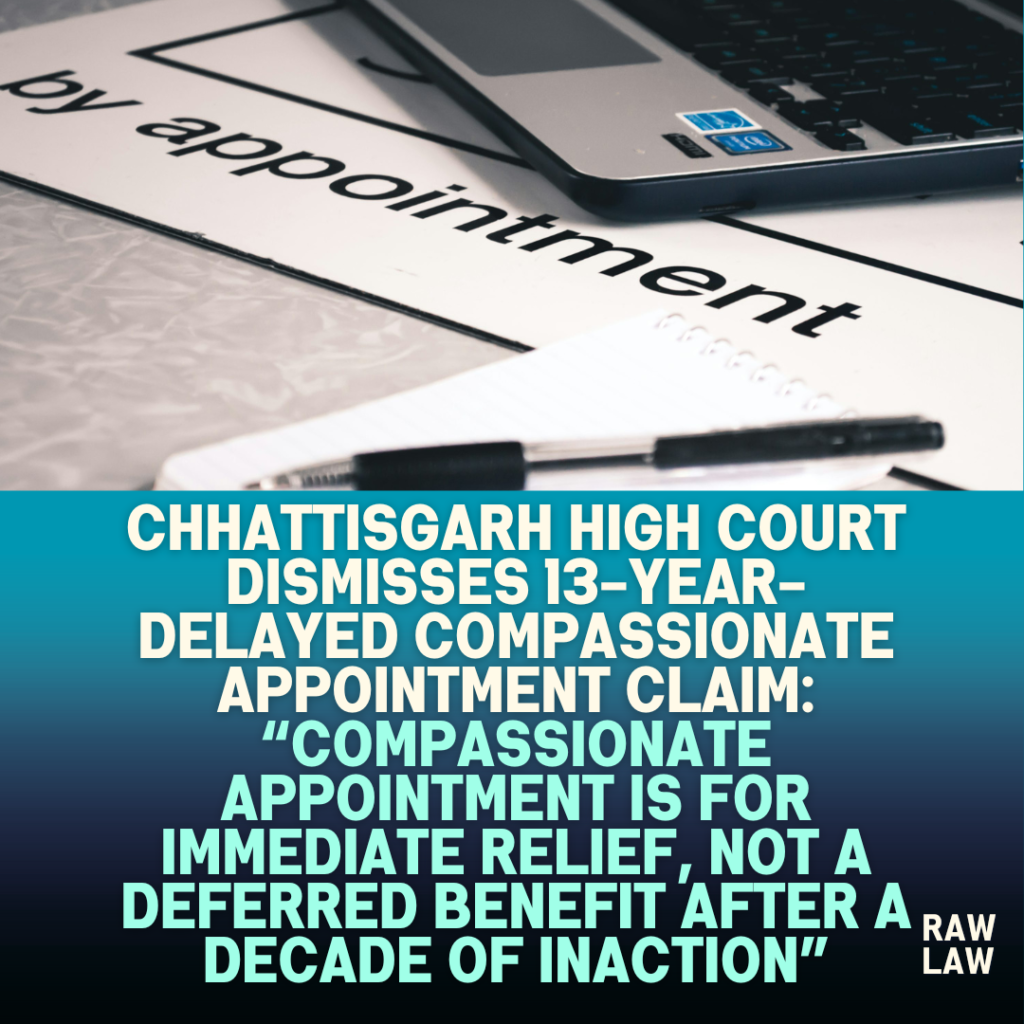Court’s Decision
The Chhattisgarh High Court, Bilaspur Bench, dismissed an intra-court appeal challenging the dismissal of a writ petition seeking compassionate appointment, observing that the application was made with an inordinate delay of over 13 years. The Division Bench comprising Chief Justice Ramesh Sinha and Justice Bibhu Datta Guru found no error in the decision of the Single Judge, who had dismissed the writ petition citing delay, policy limitations, and binding Supreme Court precedents.
The Court refused to interfere with the earlier order and affirmed that:
“The learned Single Judge has not committed any illegality, irregularity or jurisdictional error warranting interference by this Court.”
Facts
The appellant’s brother, employed as Shiksha Karmi Grade-III at a Government Middle School in District Bilaspur, passed away while in service on 02.06.2010. The deceased’s brother (appellant) claimed that he and his family were dependent on the deceased’s income and were plunged into financial distress after his untimely death.
In response, the appellant’s wife submitted an application seeking compassionate appointment for the appellant in 2010, under the relevant policy of the Chhattisgarh Government. However, this application allegedly remained pending and was not decided for more than a decade. Repeated representations were allegedly submitted to the authorities, which were met only with oral assurances but no final decision.
The appellant eventually approached the High Court by filing a writ petition in 2023, which was dismissed by the Single Judge citing excessive delay and policy constraints. Aggrieved by this, the appellant filed the present intra-court appeal.
Issues
- Whether the application for compassionate appointment filed 13 years after the death of the government employee could be considered within policy parameters.
- Whether the High Court should interfere with the decision of the Single Judge dismissing the writ petition filed after inordinate delay.
- Whether continuous representations can revive a stale claim for compassionate appointment.
Petitioner’s Arguments
The appellant contended that his family faced immense financial hardship following the death of the breadwinner. The application for compassionate appointment was filed in 2010, and repeated representations were made to the authorities thereafter. The authorities allegedly responded orally without ever issuing a formal rejection or decision. It was submitted that the fault did not lie with the appellant, and despite consistently pursuing the matter, his application remained pending. The appellant argued that the learned Single Judge failed to appreciate these continuous efforts and dismissed the petition on technical grounds of delay.
Respondent’s Arguments
The State opposed the writ appeal, arguing that the compassionate appointment policy clearly stipulates a time limit of three years, extendable by one more year for exceptional cases. The appellant had approached the authorities after 12–13 years, rendering the application barred by policy and law. It was further argued that compassionate appointment is not a matter of right, and any relaxation of the prescribed policy would be contrary to the scheme’s objectives, which aim to provide immediate relief. The learned Single Judge had correctly applied settled principles and relevant precedents of the Supreme Court, and no interference was warranted.
Analysis of the Law
The High Court underscored that compassionate appointment is an exception, not a rule, to the standard public employment procedure. It is aimed at mitigating immediate financial crises of a family following the sudden death of a breadwinner in public service. The legal framework does not contemplate or permit indefinite pendency or revival of such claims after prolonged periods.
Even if repeated representations were made, the delay of over a decade cannot be condoned unless expressly provided in the policy. The Court clarified that such representations do not extend or toll the limitation period prescribed under the policy.
Precedent Analysis
The Court relied heavily on two authoritative rulings of the Supreme Court of India:
- State of Maharashtra & Anr. v. Ms. Madhuri Maruti Vidhate (AIR Online 2022 SC 471):
The Court emphasized that compassionate appointment aims to “enable the family to tide over the sudden crisis.” Appointment after several years is contrary to the scheme’s object.
It was held: “To appoint the respondent now on compassionate ground shall be contrary to the object and purpose of appointment on compassionate ground.” - Punjab State Power Corporation Ltd. v. Nirval Singh [(2019) 6 SCC 774]:
The Apex Court held that even representations do not justify delay and that such appointments must be based on policies in force at the relevant time.
It was observed: “The very objective of providing immediate amelioration to the family is extinguished.”
Both judgments clarified that delayed claims are not maintainable, regardless of whether representations were made.
Court’s Reasoning
The Division Bench agreed with the reasoning of the learned Single Judge that the policy allowed only 3 years (plus 1) for filing an application for compassionate appointment. The appellant, having filed the writ petition 12–13 years after the death of his brother, was clearly outside the purview of the scheme. The appellant’s family had survived for over a decade, and the very purpose of compassionate appointment had ceased to exist. The Court held that humanitarian consideration must also operate within legal and policy limits.
The Court found no illegality, procedural irregularity, or jurisdictional error in the impugned judgment.
Conclusion
The High Court dismissed the writ appeal, affirming that the 13-year delay in filing the application made the claim untenable. The petitioner had failed to demonstrate any special circumstances that could justify such a long delay.
“Accordingly, the present writ appeal being devoid of merit is liable to be and is hereby dismissed.”
Implications
This ruling reaffirms the position that compassionate appointment is a measure of immediate support, not a delayed benefit. Families of deceased public servants must act promptly within the prescribed policy timelines, failing which their claims are likely to be rejected, irrespective of any continuing hardship. It also clarifies that repeated representations do not create a legal right nor extend the limitation period.
The judgment brings uniformity and certainty to administrative practices concerning such claims and discourages belated litigation on compassionate appointment.



